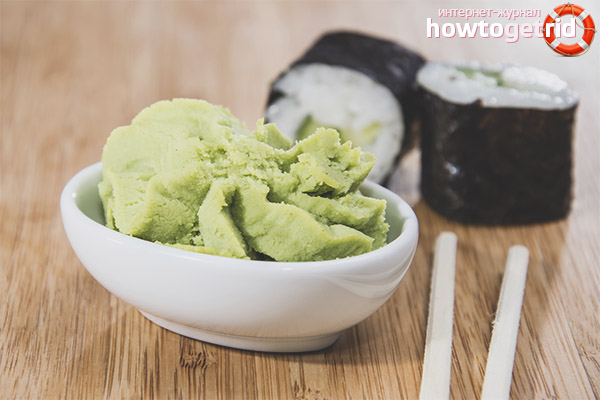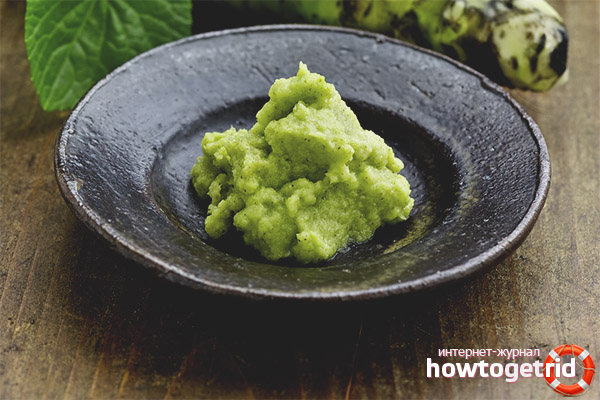The content of the article
Wasabi is a vegetable widely used as a spice because of its characteristic taste. It is part of the Brassicaceae family, which also includes other very popular and healthy vegetables, such as broccoli, cabbage, mustard and horseradish.
Wasabi root is usually chopped into a green paste, which is used as a seasoning for various dishes. But this plant also has a number of useful properties that positively affect human health.
The nutritional value
Many people think that wasabi is just another condiment that should only be used for culinary purposes. But this plant includes a large number of beneficial fibers and trace elements. Therefore, wasabi is often included in various diets.
This vegetable contains minerals such as sodium, phosphorus, calcium, zinc, magnesium, iron and potassium - substances that are vital for the functioning of the body. It is very rich in thiamine, niacin, vitamin C, riboflavin, vitamin A, folic acid and vitamin B6. It is also worth noting the presence of antioxidants, including isothiocyanates.
Wasabi Health Benefits
Mention of the world-famous condiment was found in Japanese manuscripts dating back to the seventh century. At that time, it was used as a medicinal herb, and not as a nutritional supplement. Recent studies show that the root fights various bacteria that cause diseases of the gastrointestinal tract. Often it is considered as a means of preventing food poisoning, so wasabi is usually served along with raw fish.
Anti-inflammatory effect
Green paste made with wasabi is a powerful anti-inflammatory agent that helps fight inflammation in wounds and ulcers. Wounds in the mouth and nose are an exception, as in this case the root can provoke inflammation in these places.
On the other hand, the plant is able to reduce joint pain. Therefore, it will be very beneficial for people suffering from arthritis. Wasabi prevents platelet aggregation, which is responsible for discomfort and pain. This vegetable also blocks prostaglandins, mediators responsible for inflammatory processes and pain. The action of the isothiocyanates that make up the product helps to reduce the symptoms of asthma and inflammation of the intestine.
Cancer prevention
One of the health benefits of wasabi is the prevention of cancer. Isothiocinates block enzymes that turn precancerous compounds into carcinogens called phase I enzymes. When wasabi is consumed, the liver begins to actively fight toxic substances that increase the risk of cancer. Isothiocyanates activate liver enzymes and remove cancer causing substances before they cause any damage to the body.
According to a study in 2002, isothiocyanates inhibit the development of cells that cause leukemia. Another study in Japan in 2005 found that wasabi compounds inhibit the growth of cells that cause breast cancer, which is a very common disease in the world.
A study published in the American Journal of Nutrient Science says that regular consumption of wasabi can significantly reduce the chances of developing many types of cancers associated with the digestive system, as this plant contains very strong anti-cancer compounds.
Cardiovascular Disease Prevention
Since one of the beneficial properties of wasabi is to prevent platelet aggregation, this plant significantly reduces the risk of stroke and heart attacks. This is due to the fact that platelet adhesion to each other is prevented, which is a critical situation for the body. This vegetable also helps prevent cholesterol levels.
Immunity increase
One teaspoon of wasabi root contains about 11% of the body's daily need for vitamin C. The human body is not able to reproduce vitamin C. It is for this reason that it is very important to eat natural sources of this substance. The recommended intake of this vitamin will help prevent colds and the flu, as well as maintain an adequate white blood cell count.
Improves digestion and helps to lose weight
Around the world, a huge number of people are suffering from obesity. It can cause a number of other diseases, including cancer, type 2 diabetes, stroke, and heart disease.
One of the benefits of wasabi is its low calorie and fat intake. At the same time, they provide the body with valuable nutrients and fibers, which contributes to natural weight loss. Dietary fiber contributes to rapid saturation and has a beneficial effect on the health of the digestive system. Wasabi also contributes to the normal functioning of the intestinal tract, as it eliminates toxic substances from the body.
Side effects
Excessive consumption of wasabi, like other foods, can cause certain health problems.
Excess of this plant can cause liver damage. This is due to the fact that the root of the vegetable contains a chemical component called hepatotoxin, which does not pose any danger in small doses. However, an excess of this substance leads to the fact that it does not have time to be processed in the body, which negatively affects the liver.
In addition, a large amount of this product can increase blood pressure. And people suffering from hepatitis, stomach or intestinal ulcers, pancreatitis, and some other diseases can experience complications. Therefore, wasabi should be consumed in moderation.
This seasoning can cause allergic reactions, especially in those people who first try it. If you have an allergy, as well as during pregnancy or breastfeeding, you should consult your doctor about the possibility of using wasabi.
Video: how to make wasabi powder











Submit